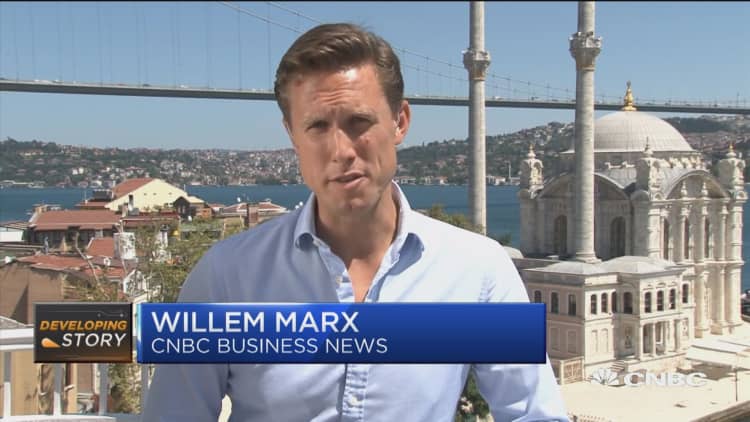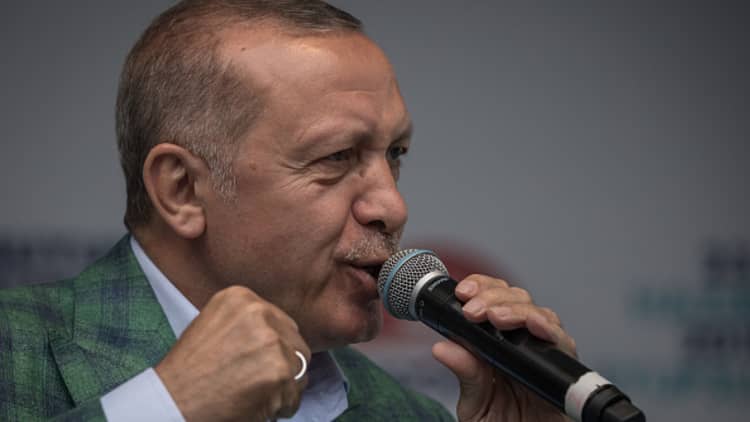Turkey's interior ministry has announced it is launching investigations into 346 social media accounts that have posted negatively about the lira, in an apparent attempt to stifle dissent amid a dramatic currency crisis.
The Istanbul prosecutor's office said Monday that the investigations target individuals that threaten Turkey's "economic security" by posting comments about the lira's weakening "in a provocative way."
The lira has lost 30 percent of its value in three days, and fallen more than 40 percent against the dollar since the start of this year amid investor fears over central bank independence and a worsening diplomatic row with the U.S.
The weakening currency took its most dramatic blows yet on the back of President Donald Trump's announcement of sanctions over Turkey's continued detention of an American pastor, Andrew Brunson, held in Ankara since 2016 on espionage charges that he denies.
The government's social media crackdown is being propped up by Turkish President Recep Erdogan's claims that the U.S. and other countries are launching "economic warfare" against the country. The prosecutor's office pledged to take action against all news, media and social media commentary deemed to undermine Turkish assets.
But the broad consensus among economists and analysts points to a gaping current account deficit and the central bank's unwillingness to raise interest rates to quell an overheating economy — under pressure by Erdogan, who has prioritized growth over addressing double-digit inflation — as the overwhelming cause of the lira's troubles.

Turkey's social media clampdown is par for the course for a president who has in recent years cracked down on local media, forced newspapers to shutter and arrested thousands of members of the press, civil society, academia and the military. Erdogan's ruling AK Party wields substantial control over the media and according to some, receive two-thirds of airtime on the country's various TV channels. According to watchdog group the Committee to Protect Journalists, Turkey holds the highest number of imprisoned journalists in the world.
"They have done this before. Trying to control the info space around the currency so as to reduce the risks of bank runs," said Timothy Ash, senior emerging markets strategist at Bluebay Asset Management. Instead of offering a clear plan to stabilize the lira, Erdogan has been urging his countrymen to trade in their dollars, euros and gold for lira as part of a "national struggle".
And in a speech Tuesday, Erdogan declared a boycott of U.S. electronics products, including Apple's iPhone.
Meanwhile, many ordinary Turks have told CNBC's reporters that they regret not holding onto more foreign cash as their own funds plummet in value. Some 50 percent of deposits in Turkish banks are in foreign currency.
"There is no speculative attack on Turkey, just markets behaving rationally," Ash said.

The lira recovered around 6 percent against the dollar Tuesday from a record low of 7.24 to the greenback on Monday. Meanwhile, the lira sell-off has spread, prompting the worst fall in emerging markets currencies overall since early 2016 and wiping out more than two years of emerging market recovery.
"Now that economics is political, it is no surprise that they are seeking clamp down on inconvenient discussion," Marcus Chenevix, a Middle East analyst at TS Lombard, told CNBC of the government's campaign. The move, he said, is indicative of the state's attempt to control all political discussion online.
There is a more significant message here though, Chenevix added. "In a currency crisis it is in the end ordinary people who do the heavy lifting. A serious run on a currency is not driven by foreign speculators but by ordinary people going to their local FX bureau and buying some dollars. The government knows this, and is trying very hard to stop it."


